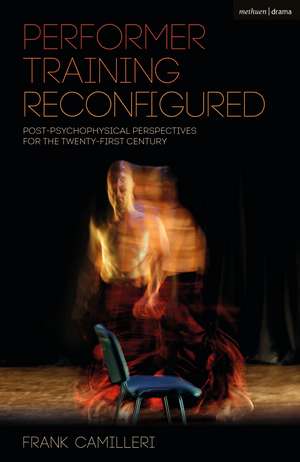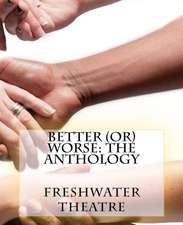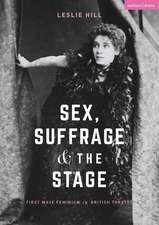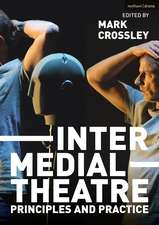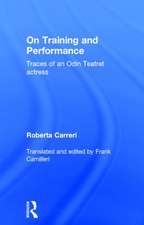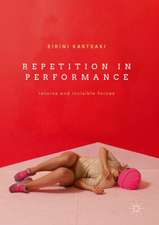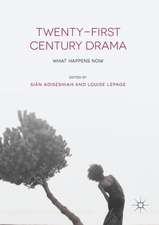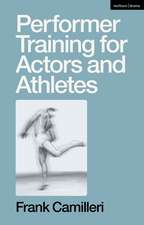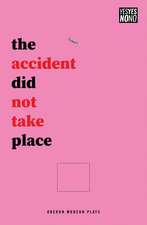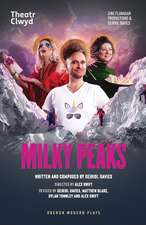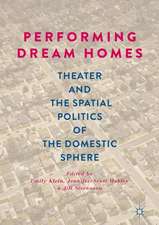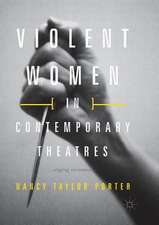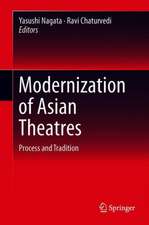Performer Training Reconfigured: Post-Psychophysical Perspectives for the Twenty-First Century: Performance Books
Autor Frank Camillerien Limba Engleză Hardback – 23 ian 2019
| Toate formatele și edițiile | Preț | Express |
|---|---|---|
| Paperback (1) | 179.09 lei 3-5 săpt. | |
| Bloomsbury Publishing – 5 feb 2020 | 179.09 lei 3-5 săpt. | |
| Hardback (1) | 568.32 lei 6-8 săpt. | |
| Bloomsbury Publishing – 23 ian 2019 | 568.32 lei 6-8 săpt. |
Din seria Performance Books
-
 Preț: 214.54 lei
Preț: 214.54 lei - 14%
 Preț: 167.08 lei
Preț: 167.08 lei - 19%
 Preț: 179.10 lei
Preț: 179.10 lei - 13%
 Preț: 174.59 lei
Preț: 174.59 lei - 18%
 Preț: 229.17 lei
Preț: 229.17 lei - 13%
 Preț: 183.10 lei
Preț: 183.10 lei - 19%
 Preț: 164.85 lei
Preț: 164.85 lei - 15%
 Preț: 110.04 lei
Preț: 110.04 lei - 18%
 Preț: 194.06 lei
Preț: 194.06 lei - 14%
 Preț: 179.09 lei
Preț: 179.09 lei - 19%
 Preț: 165.03 lei
Preț: 165.03 lei - 13%
 Preț: 134.95 lei
Preț: 134.95 lei - 18%
 Preț: 225.45 lei
Preț: 225.45 lei - 12%
 Preț: 187.54 lei
Preț: 187.54 lei -
 Preț: 166.36 lei
Preț: 166.36 lei - 13%
 Preț: 231.63 lei
Preț: 231.63 lei - 18%
 Preț: 187.70 lei
Preț: 187.70 lei - 13%
 Preț: 226.87 lei
Preț: 226.87 lei - 19%
 Preț: 149.61 lei
Preț: 149.61 lei - 18%
 Preț: 200.45 lei
Preț: 200.45 lei -
 Preț: 166.16 lei
Preț: 166.16 lei - 12%
 Preț: 184.42 lei
Preț: 184.42 lei -
 Preț: 270.52 lei
Preț: 270.52 lei - 15%
 Preț: 117.97 lei
Preț: 117.97 lei - 19%
 Preț: 157.32 lei
Preț: 157.32 lei - 14%
 Preț: 158.29 lei
Preț: 158.29 lei - 17%
 Preț: 267.32 lei
Preț: 267.32 lei - 14%
 Preț: 150.50 lei
Preț: 150.50 lei - 14%
 Preț: 157.32 lei
Preț: 157.32 lei - 14%
 Preț: 123.95 lei
Preț: 123.95 lei - 7%
 Preț: 163.53 lei
Preț: 163.53 lei -
 Preț: 177.71 lei
Preț: 177.71 lei - 15%
 Preț: 142.15 lei
Preț: 142.15 lei - 14%
 Preț: 123.77 lei
Preț: 123.77 lei - 14%
 Preț: 131.20 lei
Preț: 131.20 lei - 19%
 Preț: 156.41 lei
Preț: 156.41 lei - 14%
 Preț: 170.50 lei
Preț: 170.50 lei - 22%
 Preț: 1007.20 lei
Preț: 1007.20 lei - 14%
 Preț: 157.32 lei
Preț: 157.32 lei - 14%
 Preț: 171.05 lei
Preț: 171.05 lei - 19%
 Preț: 156.87 lei
Preț: 156.87 lei - 14%
 Preț: 164.13 lei
Preț: 164.13 lei - 19%
 Preț: 182.82 lei
Preț: 182.82 lei - 19%
 Preț: 176.33 lei
Preț: 176.33 lei - 17%
 Preț: 229.80 lei
Preț: 229.80 lei
Preț: 568.32 lei
Preț vechi: 815.67 lei
-30% Nou
Puncte Express: 852
Preț estimativ în valută:
108.74€ • 113.55$ • 89.80£
108.74€ • 113.55$ • 89.80£
Carte tipărită la comandă
Livrare economică 15-29 aprilie
Preluare comenzi: 021 569.72.76
Specificații
ISBN-13: 9781350060180
ISBN-10: 1350060186
Pagini: 288
Dimensiuni: 138 x 216 x 16 mm
Greutate: 0.47 kg
Editura: Bloomsbury Publishing
Colecția Methuen Drama
Seria Performance Books
Locul publicării:London, United Kingdom
ISBN-10: 1350060186
Pagini: 288
Dimensiuni: 138 x 216 x 16 mm
Greutate: 0.47 kg
Editura: Bloomsbury Publishing
Colecția Methuen Drama
Seria Performance Books
Locul publicării:London, United Kingdom
Caracteristici
It advances current theories which place the human body at the centre by incorporating also material circumstances and their effect on processes
Notă biografică
Frank Camilleri is Associate Professor in Theatre Studies at the University of Malta where he is also Director of the School of Performing Arts' research centre for 21st Century Studies in Performance. He is Artistic Director and founder of Icarus Performance Project, which serves as the main platform of his Practice as Research (www.icarusproject.info).
Cuprins
PrefaceNote on Text IntroductionAssemblage TheoryProblematising PresenceRelations of Exteriority'Other Way Around' PerspectivesTalking Training (or a Literature Review)Transitioning to Posthuman PerspectivesNew Fields of StudyCrossroads of Psychophysicality Chapter 1. Towards Post-Psychophysical PerspectivesInstrumental Perceptions Enabling TechnologyThings that MatterMan and Machine'Available Time' HypothesisProject Hybrid Chapter 2. Experiencing Bodyworld: Postphenomenological Perspectives Conventional PsychophysicalityIntroducing IhdePostphenomenologyMultistabilities in PerformanceInterrelational OntologyHybrid Relations, Embodied HermeneuticOther Relations Bodies (Merleau-Ponty) to Bodies (Zarrilli) to Bodies (Ihde)Suggestions for Practice Chapter 3. Of Materiality and Dynamic Hybrids: Sociomaterial PerspectivesConstructing Latour Dynamic Relations of Social NetworksDynamic HybridsTrinity of ActantsHybrids in PerformanceIdeological and Ethical ApproachesMaterial and Immaterial LabourFuture TrainingsHyphenated Perspectives for Hyphenated PracticesTips for Practice Analysis Chapter 4. Unfolding Materialities of Practice: Methodological PerspectivesWorking ArtEcology of Connected Elements in Work PracticesA Methodological FrameworkCase Study: Practitioner-Academic Hybrid PracticeTowards a Blended MethodologyTips for Practice Analysis Chapter 5. Incorporeal Materiality: Perspectives of AffectPerspective of AffectIntensities of AffectMaterialities of the World UniteEcologies of Affect for PerformanceAffective Logic, Habit, and TechniqueMime and the Punctuation of MovementPost-Psychophysical Implications of Affect Suggestions for Practice Chapter 6. Tuning to the Post-Psychophysical Dance: Perspectives from Situated Cognition Fritz Writing FritzRe(sonant)-Cognition and On-the-line EmbodimentSensorimotor Contingencies Fritz Observing RyszardBody Image, Body SchemaSensorimotor SubjectivitySensorimotor Exigencies and Affective FramingTechnology and Objects: Expansion, Extension, IncorporationIncorporated ExtensionEpistemic ActionConclusionSuggestions for Practice Glossary of TermsNotesBibliography Index
Recenzii
Camilleri boldly argues that we should move on from the psychophysical paradigm which has dominated acting theories for the last decade or more. With the term post-psychophysical, his innovative approach encompasses the much broader social and technological context in which today's performer operates, opening up new horizons for acting practices and theories. Performer Training Reconfigured is not only an important book for researchers of performance and philosophy but also one that will be useful for practitioners who will be inspired by Camilleri's perspectives and suggestions.
An excellent study of performance training that goes beyond the limits of psychophysical approaches to performance, and that introduces current thoughts about science, art and the phenomenological experience.
Density, diversity and accuracy characterize this book. It recreates a panorama that makes visible the extraordinary adventure of training, highlighting a lateral apprenticeship to the traditional preparation for acting. The book made me reflect on the material conditions in which training takes place, including as it relates to my practice, on the links between ways of thinking and acting.
It is an impressive and potentially paradigm shifting account, arising from the various turns to affect and cognition, encompassing and integrating perspectives from phenomenology, new materialism posthumanism, technoscience, suggest an alternative approaches to performance studies and practical processes. It documents how material circumstances shape and affect processes of training and performance making. In some respects it is a manifesto for the 21st century, challenging mind/body dualisms through a relational and ecological approach, conceptualized as "post psycho-physical". It invites controversy but the quality of scholarship is one of its strengths.
Performer Training Reconfigured is the culminating product of three decades of applied studio research... It is a work that navigates between analysis and practice in a re-examination of performer training and body-centered dramaturgy viewed through the lens of the post-postmodern. This is a 'must read' work for scholars and practitioners alike who are interested in theatre training and embodied practice in an age of what Camilleri identifies as post-psychophysical, that is, an epistemic universe in which technology and the material world are as important to training and expression as the corporeal self.
Frank Camilleri has opened up the ways to think about performer training in scholarship and in practice. Looking beyond the mind-body binary to the post-psychophysical, he situates performing practices within a broader spectrum of socio-materialist, technological and cognitive paradigms and pulls the discourse of performer training into the new millennium. With detail and rigour Camilleri harnesses an impressive range of theoretical constructs to sharpen the tools of analysis and to re-conceptualise the agency of the performer. His concept of bodyworld is a game changer.
In this stimulating volume, Frank Camilleri draws on his experience as a theatre practitioner-scholar to carefully tease out those aspects of performer training that are often left in the background during discussions of psychophysical performance practices. This marginalisation is performed even by those whose practices might already be post-psychophysical in Camilleri's terms. Drawing on a combination of theoretical approaches including agential realism, assemblage theory and postphenomenology, Camilleri practises a critical posthumanist reconfiguration of performer training that respectfully builds on and supplements the insights of the dominant psychophysical performance paradigm.
An excellent study of performance training that goes beyond the limits of psychophysical approaches to performance, and that introduces current thoughts about science, art and the phenomenological experience.
Density, diversity and accuracy characterize this book. It recreates a panorama that makes visible the extraordinary adventure of training, highlighting a lateral apprenticeship to the traditional preparation for acting. The book made me reflect on the material conditions in which training takes place, including as it relates to my practice, on the links between ways of thinking and acting.
It is an impressive and potentially paradigm shifting account, arising from the various turns to affect and cognition, encompassing and integrating perspectives from phenomenology, new materialism posthumanism, technoscience, suggest an alternative approaches to performance studies and practical processes. It documents how material circumstances shape and affect processes of training and performance making. In some respects it is a manifesto for the 21st century, challenging mind/body dualisms through a relational and ecological approach, conceptualized as "post psycho-physical". It invites controversy but the quality of scholarship is one of its strengths.
Performer Training Reconfigured is the culminating product of three decades of applied studio research... It is a work that navigates between analysis and practice in a re-examination of performer training and body-centered dramaturgy viewed through the lens of the post-postmodern. This is a 'must read' work for scholars and practitioners alike who are interested in theatre training and embodied practice in an age of what Camilleri identifies as post-psychophysical, that is, an epistemic universe in which technology and the material world are as important to training and expression as the corporeal self.
Frank Camilleri has opened up the ways to think about performer training in scholarship and in practice. Looking beyond the mind-body binary to the post-psychophysical, he situates performing practices within a broader spectrum of socio-materialist, technological and cognitive paradigms and pulls the discourse of performer training into the new millennium. With detail and rigour Camilleri harnesses an impressive range of theoretical constructs to sharpen the tools of analysis and to re-conceptualise the agency of the performer. His concept of bodyworld is a game changer.
In this stimulating volume, Frank Camilleri draws on his experience as a theatre practitioner-scholar to carefully tease out those aspects of performer training that are often left in the background during discussions of psychophysical performance practices. This marginalisation is performed even by those whose practices might already be post-psychophysical in Camilleri's terms. Drawing on a combination of theoretical approaches including agential realism, assemblage theory and postphenomenology, Camilleri practises a critical posthumanist reconfiguration of performer training that respectfully builds on and supplements the insights of the dominant psychophysical performance paradigm.
